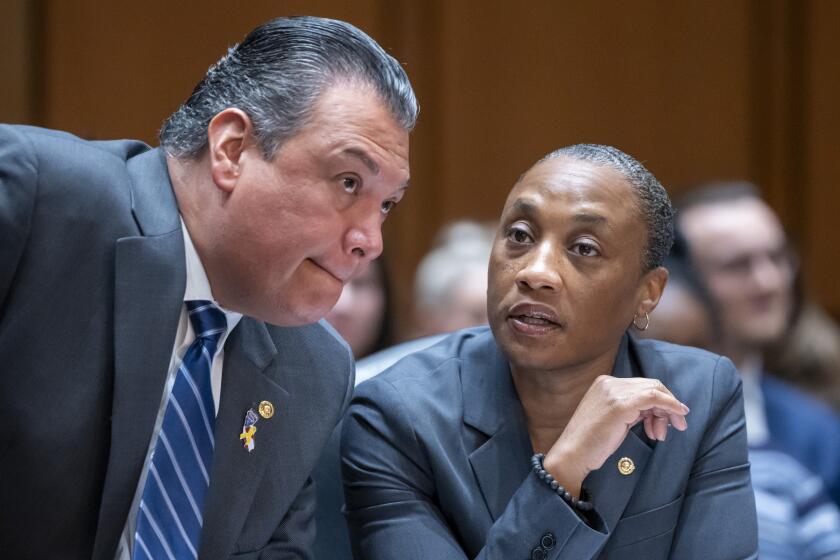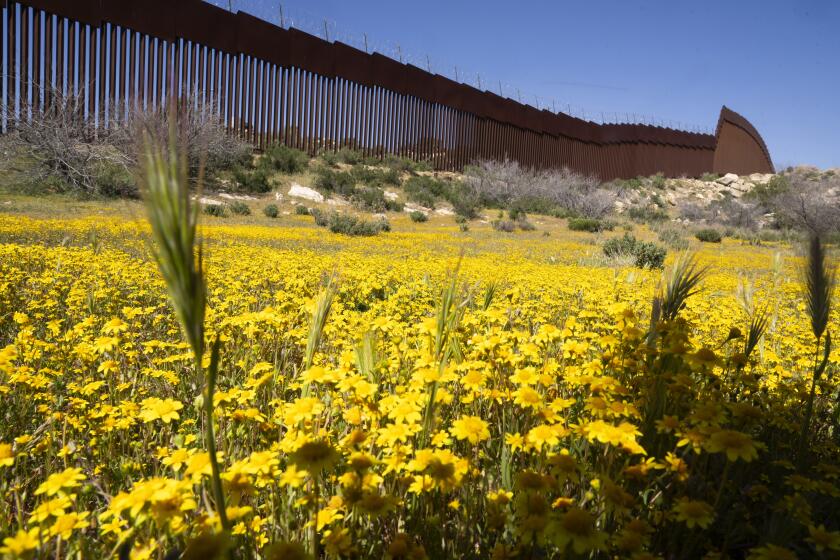U.S.-Backed Kidnapings Ruled Illegal
A foreign defendant kidnaped abroad at the behest of U.S. agents cannot be prosecuted here if an extradition treaty with the other country is in place and officials of that government protest the abduction, a federal appeals court ruled Monday.
The U.S. 9th Circuit Court of Appeals ruled in San Francisco that a Mexican citizen convicted of involvement in the 1985 murder of U.S. drug agent Enrique Camarena must be given a hearing on whether the U.S. government orchestrated his kidnaping by authorities in his homeland.
The court said that if Rene Martin Verdugo Urquidez, currently serving a 240-year federal prison sentence, proves his contention that the Drug Enforcement Administration orchestrated his 1986 kidnaping in Mexico, then the government must turn him over to Mexican authorities.
The judges rejected the government’s contention, based on earlier cases, that the question of how Verdugo was brought to trial was irrelevant. They said that if a valid extradition treaty is in force, as the United States has with Mexico, authorities are not permitted to sponsor or participate in the kidnaping of a suspect to bring him to trial if the other nation formally protests.
Several international law experts praised the decision which, in some respects, represents a significant departure from a long line of federal court rulings.
Since 1886, U.S. law has generally held that a forcible abduction does not offend due process, or prohibit a U.S. court from trying someone brought to trial after being kidnaped.
However, Monday’s ruling said there was a vital distinction between the Verdugo case and earlier ones.
“No prior reported case,” the judges stressed, had addressed the ultimate issue posed by this one--whether a U.S. court could try a defendant who had been kidnaped from a country with whom the U.S. had an extradition treaty in a situation where the other country formally protested the abduction.
According to legal experts, the ruling also makes it highly likely that the 9th Circuit will uphold a judge’s decision that the U.S. cannot try a Mexican physician, Humberto Alvarez Machain, who was kidnaped last year and brought to the United States after being indicted in the Camarena case.
But the decision is not likely to affect the case of former Panamanian dictator Gen. Manuel Antonio Noriega--who was brought to Florida to stand trial on narcotics charges after surrendering to U.S. forces who invaded his country in 1989--because Panamanian officials who assumed power after the invasion were his adversaries and did not protest his arrest or extradition.
Monday’s ruling represents a stinging rebuke to the Justice Department, which has taken the position that it is authorized to participate in such abductions.
The decision was written by U.S. Circuit Court Judge Stephen Reinhart and was joined by Circuit Judge Dorothy W. Nelson.
Circuit Judge James R. Browning concurred in part and dissented in part.
Reinhardt made what appeared to be a pointed comment to the Bush Administration at the end of the ruling:
“If we are to see the emergence of a ‘new world order’ in which the use of force is to be subject to the rule of law, we must begin by holding our government to its fundamental legal commitments.”
He also wrote, “a kidnaping is a flagrant treaty violation because it wholly circumvents the extradition process, and with it the commitment of the United States to follow the rule of law in its international relations.”
Additionally, the judges also issued a warning about the potential negative consequences in this country if they had reached a different result:
“Were we to hold, as the government urges, that the United States may invade the sovereign territory of Mexico and kidnap an individual without violating this nation’s treaty obligations, it would follow inexorably that no treaty bar exists to similar acts by foreign government against citizens of the United States in this country.”
The Justice Department strongly disagrees with the decision, spokesman Dan Eramian said.
“We don’t think it’s in line with other related Supreme Court or appeals court decisions,” he said. “We don’t believe there was a violation of the extradition treaty.
“I would anticipate that we would seek a hearing in the 9th Circuit” or appeal to the Supreme Court, he added.
Verdugo’s lawyer, Patrick Hall of San Diego, said he was “delighted” with the decision and expressed confidence that he would be able to prove that the U.S. government had been involved in his client’s 1986 abduction.
Verdugo, 39, is a former Mexicali resident who is now in the federal prison in Leavenworth, Kan. The once wealthy businessman allegedly supervised the transportation of tons of marijuana into Southern California for a Mexican narcotics cartel.
He was arrested in San Felipe, Mexico, on Jan. 24, 1986, by Mexican authorities. Verdugo was blindfolded, handcuffed, placed in the back seat of a car and driven to the border at Calexico, where he was handed through the fence to waiting U.S. marshals who had a warrant for his arrest. U.S. authorities have acknowledged paying $32,000 for the transaction.
The Mexican government later filed a formal protest over the circumstances of the arrest.
In 1988, Verdugo’s lawyers asserted in Los Angeles that U.S. courts had no jurisdiction to try him because of the manner in which he was arrested. U.S. District Judge Edward Rafeedie disagreed, relying on decisions from prior cases.
In September, 1988, a federal court jury here found Verdugo guilty of five felonies in the February, 1985, kidnaping and murder of Camarena in Guadalajara. Verdugo admitted being in Guadalajara at the time of the murder but denied any involvement in the killing.
Two international law experts lauded Monday’s decision.
“I believe this may mark the end of the U.S. government’s ill-founded ‘catch and snatch’ policy,” said Fordham law professor Abraham Abramovsky.
“It always seemed a bit incongruous that our government could obtain people for prosecutions in this country in a way that seemed to flout international law . . . while our nation is one of the most vocal in calling other countries to task for their violations of international law,” said Prof. Charles Weisselberg of the USC Law Center.
Browning dissented from the ruling in part, contending that the Mexican government’s protests had not made it clear that they were asking the U.S. government to return Verdugo to Mexico.
The judge said that Mexico’s protests had been much clearer and more explicit after Alvarez’s kidnaping last year. He said that, while he agreed with Monday’s decision in principle, the case should have been sent back to the the lower court for a hearing on whether Mexico had actually sought Verdugo’s repatriation.
More to Read
Start your day right
Sign up for Essential California for news, features and recommendations from the L.A. Times and beyond in your inbox six days a week.
You may occasionally receive promotional content from the Los Angeles Times.






